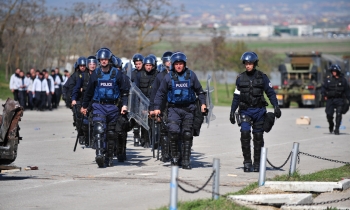NEW YORK -- With a ferociousness usually reserved for presidents caught lying to the public, the journalism world has turned on The New York Times and its reporter Judith Miller, who only weeks ago was being lauded for going to jail to protect a source.
A few media critics and academics suggested Monday that the Pulitzer Prize-winning reporter should be fired for her actions covering the search for weapons of mass destruction in Iraq. Miller also was blasted for failing to explain how she learned the identity of the CIA agent wife of a Bush administration critic.
"It's not enough that Judith Miller, we learned Saturday, is taking some time off and `hopes' to return to the New York Times newsroom," Greg Mitchell, the editor of the journalism trade publication Editor & Publisher, wrote in an online column. "She should be promptly dismissed for crimes against journalism, and her own newspaper."
The reaction stemmed from a pair of articles published over the weekend in the Times, which revealed several new details about Miller's coverage of the war and interactions with administration officials.
Among the revelations: Miller said she didn't believe I. Lewis Libby, the vice president's chief of staff, first told her the name of agent Valerie Plame, but she said she couldn't remember who did. She said she had agreed to identify Libby in a story only as a "former Hill staffer," even though he worked not for Congress but for Cheney.
Also, a first-person account by Miller said the Pentagon had given her "clearance to see secret information" while she traveled in Iraq with a military unit hunting for unconventional weapons.
Embedded reporters were regularly granted access to some classified information about basic military operations, but it wasn't clear from Miller's article whether she was describing such a routine arrangement or implying she had broader clearance.
Miller did not immediately return a call to her cell phone Monday night in Las Vegas, where she was scheduled to receive the Society of Professional Journalists's First Amendment Award Tuesday for going to jail to protect a source.
Alex Jones, a former New York Times reporter who directs the Shorenstein Center on the Press, Politics and Public Policy at Harvard University, said the newspaper had not yet sufficiently explained Miller's behavior.
"The credibility of The New York Times is at stake," he said. "She either needs to be given a clean bill of health, or she needs to be told that she can't represent the Times anymore."
Times Executive Editor Bill Keller, in a memo to staff, expressed the hope that the brouhaha would subside but he did not disclose what further action, if any, the paper would take.
Miller spent 85 days in jail for initially refusing to tell a grand jury whether Libby had spoken to her about Plame, a covert CIA official whose identity was leaked to journalists in 2003.
Miller was released from jail in late September after she agreed to testify, saying that her source had released her from her vow to keep his identity a secret.
The Times offered a pair of stories on its own role in the episode Sunday, one written by staff reporters, and the other Miller's first-person account.
The ensuing criticism stunned some of Miller's allies.
Floyd Abrams, a lawyer for Miller and The New York Times, blamed this week's criticism, in part, to lingering unhappiness over a number of Miller stories that strongly suggested the presence of weapons of mass destruction in Iraq.
"This seems to be a day for piling on Judy Miller," he said. "It is regrettable that more than a few journalists seem unable to distinguish between their criticism of particular stories she has written, and her principled defense of the First Amendment."
In its Sunday articles, the Times painted an at-times unflattering picture of Miller and her editors.
It said the newspaper's publisher, Arthur Sulzberger Jr., and Keller, "knew few details about Ms. Miller's conversations with her confidential source other than his name," and never reviewed her notes.
It also described Miller as "an intrepid reporter whom editors found hard to control." The Times has acknowledged publicly that several of Miller's stories on Iraqi weapons of mass destruction were most likely wrong, and criticized itself for not questioning them more closely.
Miller was taken off of Iraq and weapons stories but drifted back onto the national security beat, the Sunday article said.
She had a rare degree of autonomy that once prompted her to jokingly call herself "Miss Run Amok," the article said, and some of her colleagues refused to work with her.
Tom Rosenstiel, director of the Project for Excellence in Journalism, praised the Times for its willingness to be candid about the divisions within its newsroom.
He added, though, that he was among those who believed the newspaper had more explaining to do about what led to Miller's release from jail, and whether she really couldn't remember who told her Plame's name.









